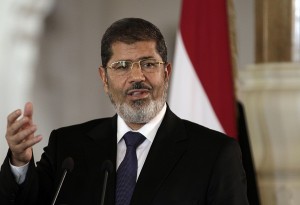CAIRO—The Army chief came to President Mohammed Morsi with a simple demand: Step down on your own and don’t resist a military ultimatum or the demands of the giant crowds in the streets of Egypt.
“Over my dead body!” Morsi replied to Gen. Abdel-Fattah el-Sissi on Monday, two days before the Army eventually ousted the Islamist leader after a year in office.
In the end, Egypt’s first freely elected president found himself isolated, with allies abandoning him and no one in the Army or police willing to support him.
Even his Republican Guards simply stepped away as Army commandos came to take him to an undisclosed defense ministry facility, according to Army, security and Muslim Brotherhood officials who gave The Associated Press an account of Morsi’s final hours in office. They spoke on condition of anonymity because they were not authorized to talk to the media.
The Muslim Brotherhood officials said they saw the end coming for Morsi as early as June 23—a week before the opposition planned its first big protest. The military gave the president seven days to work out his differences with the opposition.
Too much power
In recent months, Morsi had been at odds with virtually every institution in the country, including the top Muslim and Christian clerics, the judiciary, the armed forces, the police and intelligence agencies.
His political opponents fueled popular anger that Morsi was giving too much power to the Brotherhood and other Islamists, and had failed to tackle Egypt’s mounting economic problems.
There was such distrust between Morsi and the security agencies that they began withholding information from him—deploying troops and armor in cities in the past week without his knowledge, the officials said.
The police also refused to protect Muslim Brotherhood offices that came under attack in the latest wave of protests.
Thus, when Morsi was fighting for his survival, there was no one to turn to, except calling for outside help through Western ambassadors and a small coterie of aides from the Brotherhood who could do little more than help him record two last-minute speeches.
Electoral legitimacy
In those remarks, he emotionally emphasized his electoral legitimacy—a topic that Morsi repeatedly raised in the talks with el-Sissi.
Early this week, during two meetings in as many days, Morsi, el-Sissi and Hesham Kandil, the Islamist-backed prime minister, sat down to discuss ways out of the crisis in which millions of Egyptians were clamoring for the president to resign.
But Morsi kept returning to the mandate he won in the June 2012 balloting, according to one of the officials. He said Morsi wouldn’t deal with the mass protests or any of the country’s most pressing problems—tenuous security, rising prices, unemployment, power cuts and traffic congestion.
A Brotherhood spokesperson, Murad Ali, said the military had already decided that Morsi had to go, and el-Sissi would not entertain any of the concessions that the president was prepared to make.
“We were naive. … We didn’t imagine betrayal would go this far,” Ali said.
“It was like, ‘Either we put you in jail, or you come out and announce you are resigning,”’ Ali added. “He didn’t do either because he didn’t want to hand the country to the military again.”
But according to one official, Morsi delivered the final, terse response to el-Sissi’s demand: “Over my dead body!”
